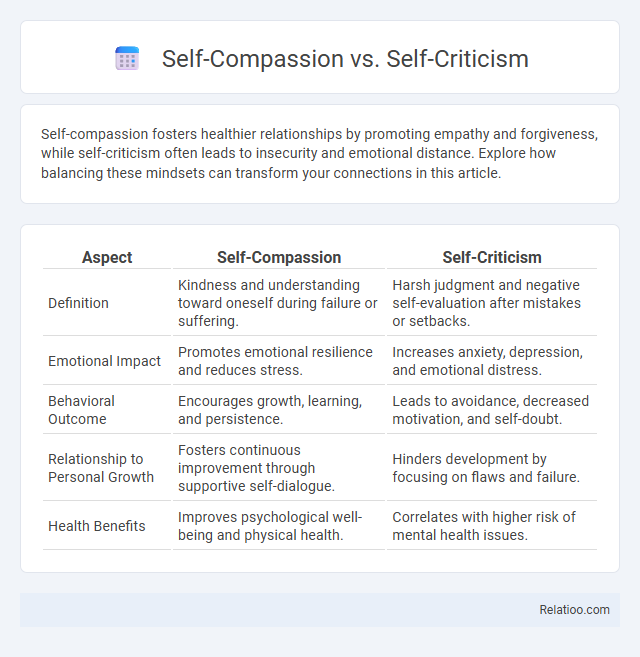Self-compassion fosters healthier relationships by promoting empathy and forgiveness, while self-criticism often leads to insecurity and emotional distance. Explore how balancing these mindsets can transform your connections in this article.
Table of Comparison
| Aspect | Self-Compassion | Self-Criticism |
|---|---|---|
| Definition | Kindness and understanding toward oneself during failure or suffering. | Harsh judgment and negative self-evaluation after mistakes or setbacks. |
| Emotional Impact | Promotes emotional resilience and reduces stress. | Increases anxiety, depression, and emotional distress. |
| Behavioral Outcome | Encourages growth, learning, and persistence. | Leads to avoidance, decreased motivation, and self-doubt. |
| Relationship to Personal Growth | Fosters continuous improvement through supportive self-dialogue. | Hinders development by focusing on flaws and failure. |
| Health Benefits | Improves psychological well-being and physical health. | Correlates with higher risk of mental health issues. |
Understanding Self-Compassion: Key Concepts
Self-compassion involves treating oneself with kindness, recognizing shared human experiences, and maintaining mindful awareness during difficult times. It contrasts with self-criticism, which often magnifies personal flaws and fosters negative emotions, while positivity emphasizes focusing on favorable outcomes without necessarily addressing emotional struggles. Understanding the core components of self-compassion--self-kindness, common humanity, and mindfulness--helps individuals develop healthier emotional resilience and psychological well-being.
What Is Self-Criticism? Origins and Effects
Self-criticism involves a harsh internal dialogue that judges one's actions and character, often rooted in early experiences of conditional acceptance or unrealistic standards set by caregivers and society. This negative self-evaluation can lead to increased stress, anxiety, and decreased motivation by fostering feelings of unworthiness and failure. Understanding self-criticism's psychological origins highlights its impact on mental health and underscores the importance of cultivating self-compassion and balanced positivity.
Psychological Benefits of Self-Compassion
Self-compassion fosters emotional resilience by promoting kindness toward oneself during failures, reducing negative self-judgment inherent in self-criticism. Research indicates self-compassion correlates with lower levels of anxiety, depression, and stress, enhancing overall mental health beyond the effects of mere positivity. Unlike positivity, which emphasizes maintaining an optimistic outlook, self-compassion allows for realistic acceptance of flaws, enabling healthier psychological outcomes and sustained well-being.
The Hidden Costs of Self-Criticism
Self-criticism often masquerades as motivation but carries hidden costs such as increased stress, diminished self-esteem, and impaired mental health, which can undermine long-term productivity and well-being. Unlike self-compassion, which fosters resilience and emotional regulation, persistent self-criticism triggers a harmful cycle of negative self-evaluation and emotional distress. Emphasizing positivity alone may overlook underlying issues, whereas balanced self-compassion encourages growth without self-judgment or denial of challenges.
Self-Compassion vs Self-Criticism: A Comparative Overview
Self-compassion entails treating oneself with kindness and understanding during times of failure or difficulty, fostering emotional resilience and mental well-being. In contrast, self-criticism involves harsh judgment and negative self-evaluation, which can exacerbate stress and diminish self-esteem. Research reveals that cultivating self-compassion reduces anxiety and depression more effectively than focusing solely on positive thinking, highlighting its critical role in psychological health.
Impacts on Mental Health and Well-Being
Self-compassion fosters emotional resilience by encouraging kindness towards yourself during failures, reducing stress and anxiety, and promoting overall mental health. In contrast, self-criticism often exacerbates negative emotions, increasing the risk of depression and lowering self-esteem. Cultivating positivity enhances well-being by shifting your focus to strengths and growth, supporting a healthier mindset and improved psychological resilience.
Cultivating Self-Compassion: Practical Strategies
Cultivating self-compassion involves recognizing your own suffering with kindness rather than harsh judgment, which can reduce the negative impacts of self-criticism and improve emotional resilience. Practical strategies include mindfulness meditation to stay present, journaling to acknowledge and soothe difficult emotions, and positive affirmations that reinforce your inherent worth. Building a habit of self-compassion helps you maintain balanced positivity, fostering a healthy mindset without ignoring genuine challenges.
Overcoming Patterns of Self-Criticism
Overcoming patterns of self-criticism involves cultivating self-compassion, which promotes emotional resilience by encouraging kindness and understanding toward oneself despite imperfections. Research from the University of Texas shows that individuals practicing self-compassion experience reduced stress and lower levels of depression compared to those relying on self-criticism. Emphasizing positivity through realistic affirmations aids in reshaping neural pathways, fostering a healthier internal dialogue and breaking the cycle of negative self-judgment.
Real-Life Examples: Transformations Through Self-Compassion
Self-compassion fosters resilience in individuals facing failure by encouraging self-kindness rather than harsh self-judgment, as seen in athletes who recover stronger after setbacks through supportive self-talk. In contrast, self-criticism often exacerbates stress and diminishes motivation, demonstrated by students who spiral into anxiety and underperformance due to relentless inner negative dialogue. Cultivating positivity through realistic self-compassion transforms mental health outcomes by promoting acceptance and growth, evidenced by patients managing chronic illness who report improved well-being when practicing mindful self-kindness.
Choosing Self-Compassion for Lasting Personal Growth
Choosing self-compassion over self-criticism fosters a healthier mindset that encourages personal growth and emotional resilience. Unlike fleeting positivity, self-compassion allows you to embrace imperfections and learn from setbacks with kindness, promoting sustainable change. Your ability to nurture self-compassion directly impacts mental well-being and long-term success.

Infographic: Self-Compassion vs Self-Criticism
 relatioo.com
relatioo.com